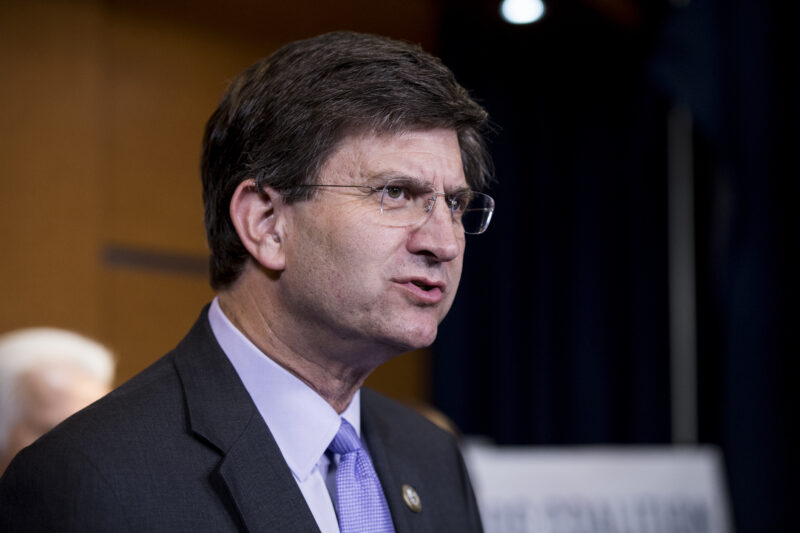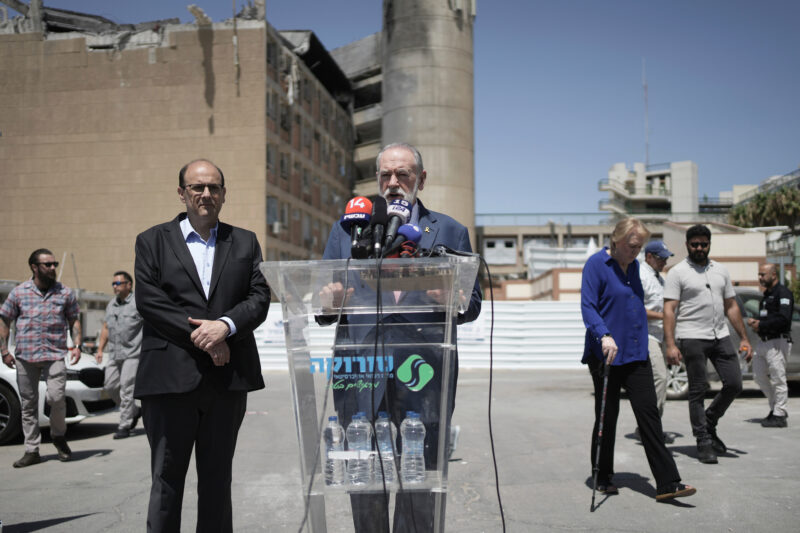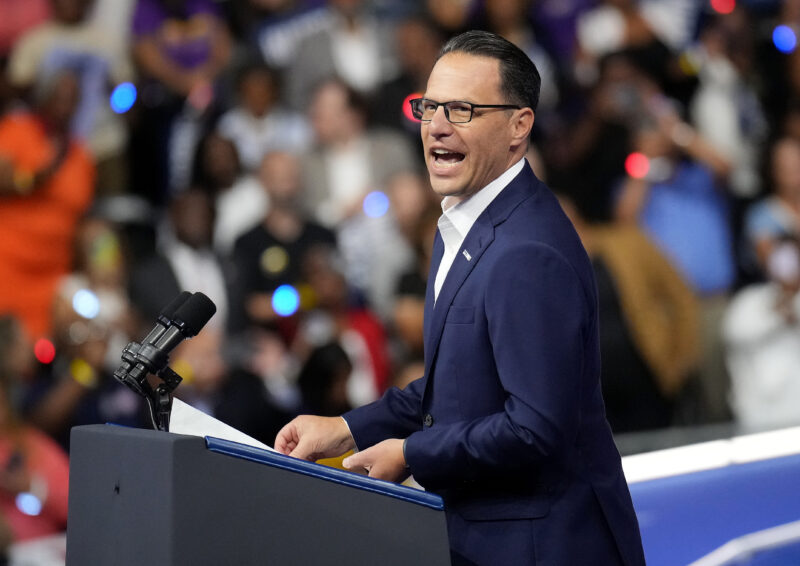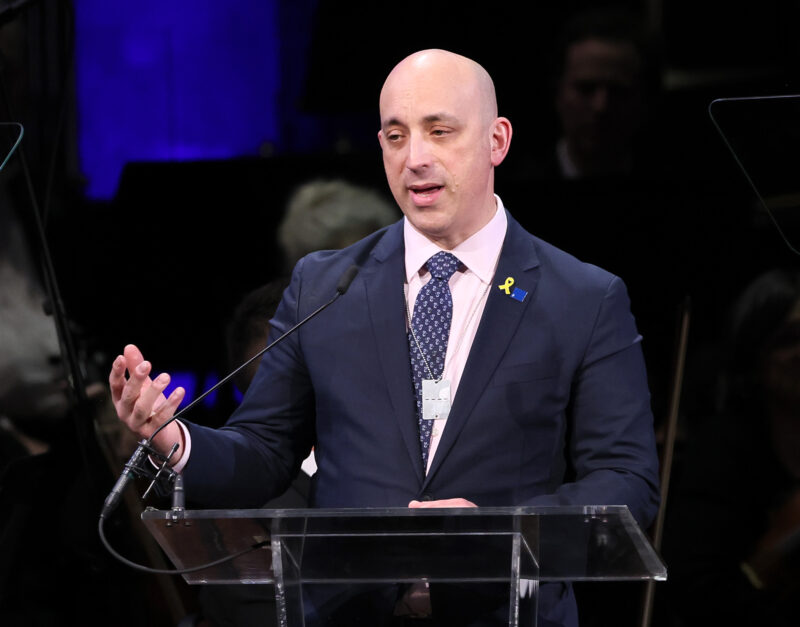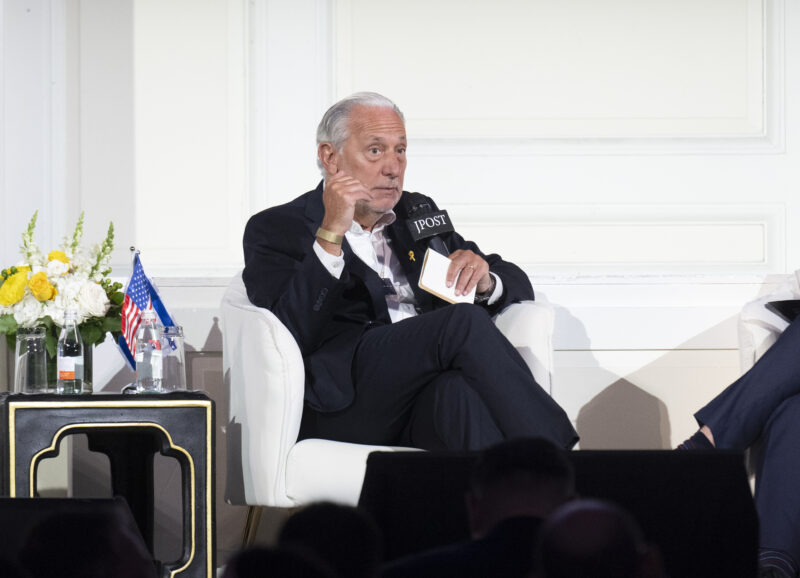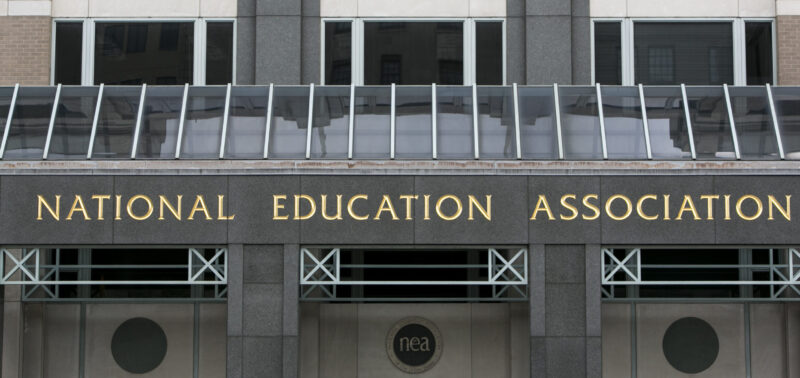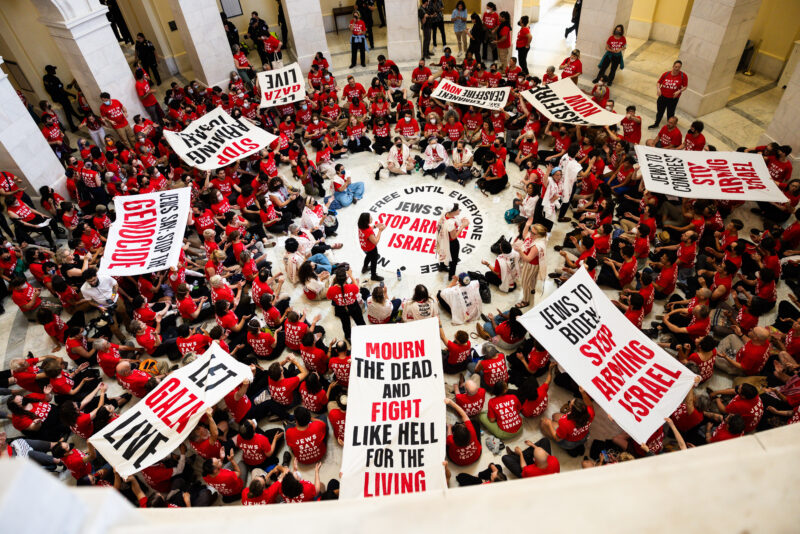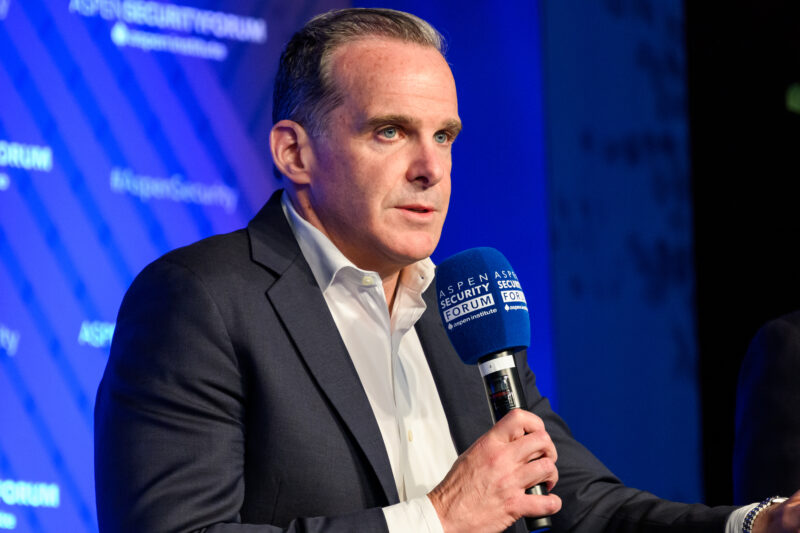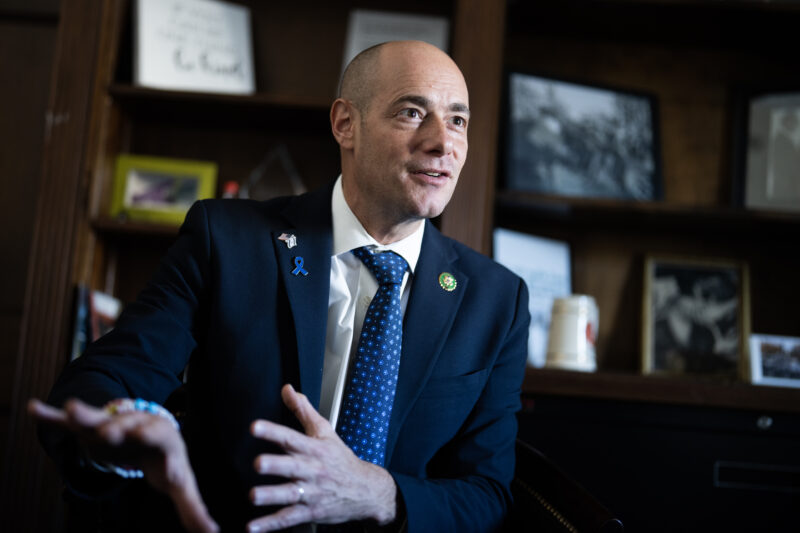ADL CEO Jonathan Greenblatt: ‘I'd like to see the extremes marginalized so the vast majority of members of Congress on both sides can get the stuff done that needs to happen’

Marc Rod
Lawmakers gather on the Capitol steps on June 10, 2025 for a vigil for Yaron Lischinsky and Sarah Milgrim, Israeli Embassy staffers who were killed in an anti-Israel attack.
It’s been two months since the Capital Jewish Museum shooting in Washington and the Boulder, Colo. firebombing attack.
The two attacks prompted unified condemnation from lawmakers and calls from the Jewish community for Capitol Hill to take aggressive action against the escalating antisemitism crisis in the United States. But as Congress heads into its August break, that initial momentum has produced little concrete action.
The House and Senate have passed resolutions condemning the attacks, but key legislation related to antisemitism remains stalled, even as lawmakers individually and in groups continue to press for action.
There are still no clear prospects for passage of the Antisemitism Awareness Act, a key element of congressional efforts to address antisemitism, after a contentious Senate committee meeting in April in which Democrats, joined by Republicans including Sen. Rand Paul (R-KY), voted to add amendments that most Republicans supporting the bill view as nonstarters. House leaders have made no public moves to advance the legislation.
And despite calls from Jewish groups for significant increases in nonprofit security funding to as much as $1 billion next year and a push from a bipartisan coalition of lawmakers for $500 million, the funding levels under consideration in the House are so far little different from those discussed in prior years.
One Republican senator working on the Antisemitism Awareness Act told Jewish Insider they have not seen much movement among colleagues who have continued concerns about the legislation, in conversations with those colleagues and the White House.
The senator said they are frustrated by unresolved disputes about the International Holocaust Remembrance Alliance’s working definition of antisemitism on the Republican side of the aisle, noting as well that there are steps the administration can take independently.
Jonathan Greenblatt, the CEO of the Anti-Defamation League, said at a press conference last week that “there needs to be, for sure” more focus from Congress on tackling antisemitism. A key part of that, he said, will be sidelining extreme voices.
“I think too often extremes on both ends kind of warp the conversation and insist that the definition of antisemitism somehow needs to include things like the false charge of ‘the Jews murdered Jesus,’ or the claim that anti-Zionism is never antisemitism,” Greenblatt said, alluding to the objections from both sides of the aisle to the Antisemitism Awareness Act.
“All the Jews didn’t murder Jesus, and anti-Zionism is antisemitism. I think I’d like to see the extremes marginalized so the vast majority of members of Congress on both sides can get the stuff done that needs to happen once and for all,” he continued.
Several sources familiar with the situation said that the bill is “stuck,” for the moment. Senate Republicans could attempt to bring the bill to the floor and utilize procedural means to eliminate the poison-pill amendments added to the bill in the Senate Health, Education Labor and Pensions Committee, but that would require Democratic support and could rehash the same ugly debates seen in the HELP committee.
It could also be added to a must-pass legislative package — but that same plan failed last year.
A source who has advocated for the legislation said that the recently passed budget reconciliation package sapped attention for antisemitism legislation in recent months, but argued that passing the Antisemitism Awareness Act is critical because there are no realistic alternative proposals for tackling antisemitism on Congress’s agenda at this point.
The Senate has also been focused on confirming presidential appointees.
The source said that advocates for the bill need to find strategies to work around the obstacles to the legislation, “and that has not been easy,” but insisted that they and others are not giving up on the bill.
“There just hasn’t been a lot of legislation [moving] in general,” Nathan Diament, the executive director of public policy for the Orthodox Union, said — arguing that the slow progress is not unique to the Antisemitism Awareness Act or antisemitism generally.
Sen. Jacky Rosen’s (D-NV) office told JI that she is continuing to advocate for the Antisemitism Awareness Act, and is also looking at potential other legislation that could move forward on antisemitism. Rosen, the co-chair of the Senate antisemitism task force, is the lead Democratic sponsor of the Antisemitism Awareness Act.
Senate Republicans had vowed, coming into the majority, to pass the bill.
“Republican control of the Senate means that this institution will no longer turn a blind eye to the growing threat of antisemitism in our country or the numerous threats that our ally Israel faces on all sides,” Senate Majority Leader John Thune (R-SD) told JI after Republicans won the Senate majority. “We will empower committees to advance legislation addressing antisemitism and protecting students on campuses, and we will increase oversight into Iran’s malign actions.”
On the House side, Rep. Mike Lawler (R-NY) told JI last week that “we’re working on” the Antisemitism Awareness Act. Pressed on whether Congress is moving strongly enough to respond to antisemitic violence, Lawler said, “It continues to be a strong focus of mine and many of my colleagues, and we’re working through the legislation.”
House Speaker Mike Johnson (R-LA) did not respond to a request for comment.
Observers believe the House, which passed the bill last year only for it to fail to move forward in the Senate, is waiting on the Senate to move first this year and prove that it can pass the bill.
Another source argued that, given the action the administration has taken to address antisemitism on college campuses, the Antisemitism Awareness Act is “less necessary” in the near term.
On NSGP funding, the House Appropriations Committee approved a bill that would allocate $335 million for the program in 2026 — the same funding level that the House backed for the program in 2025, though final funding levels ultimately fell short of that mark.
The Senate Appropriations Committee, meanwhile, has yet to finalize its homeland security funding bill. Sen. Chris Murphy (D-CT), the ranking member of the subcommittee responsible for such funding, told JI last week that lawmakers are “still negotiating” it.
Congress will have just a month to finalize government funding or pass a stopgap bill when it returns from August recess.
A Republican senator working on the issue said they’ve been focusing on ensuring that outstanding NSGP funding for this year is disbursed from the administration before turning to the appropriations process for next year.
“First things first on it, let’s get the grant money out so people can actually create a more secure environment where they’re physically located,” the senator said. The administration opened applications for the 2025 grant program on Monday, but some supplemental funding remains to be allocated.
Diament said that Congress is in the “fourth or fifth inning out of nine” on government funding, and that the process will likely play out mostly in September or October. He also argued that, given the “tight fiscal environment,” particularly for homeland security funding, the fact that advocates were able to secure a $30 million increase in NSGP funding from the initial proposed level of $305 million, on a bipartisan basis in the House Appropriations Committee is very “valuable in the process going forward.”
In “the later innings of the process, it laid very good groundwork” for further bipartisan movement to increase funding as the process proceeds, Diament continued. “We made sure to work it on a bipartisan basis and we’re moving in the right direction.”
“Given everything else on the legislative calendar and where we are on the legislative calendar, I don’t feel like we’re behind,” he continued.
Rep. Don Bacon (R-NE), a co-chair of the House antisemitism task force, asked about congressional action on antisemitism last week, said that “there’s a place for legislation” but argued that other steps are also needed to make antisemitism unacceptable in public discourse.
“In the end, Americans have to speak out on this,” Bacon said at a press conference on legislation aiming to tackle support for terrorism on social media. “We have to make it like it’s embarrassing to be standing on that side saying those things. So we got to speak up. And you can’t legislate that.”
Several Democrats said last week that more needs to be done legislatively to tackle antisemitism.
“We’ve had an unlimited amount of hearings, and the speaker has now come out with a security plan [for members] for the summer, and a lot of that, obviously, is tied to the amount of hate and threats that we are getting, but we still haven’t passed the Antisemitism Awareness Act,” Rep. Jared Moskowitz (D-FL) said. “No, we’re not doing enough to combat antisemitism and other forms right now of hate and demagoguery that’s going on.”
“The language and the culture, it’s just completely toxic,” Moskowitz continued, adding that Congress is “also not doing enough on the security grants. … They gave ICE $140 billion. We’re trying to get more money for security when the community is in grave danger, and these threats are out of control, at all-time levels.”
Sen. Richard Blumenthal (D-CT) said that “there can never be too much focus on antisemitism, and I see, frankly, too little right now, in light of events that are unfolding around the country.”
“I wish there were more focus on bias and bigotry of all forms, because it is growing, and so is violent extremism and the confluence of the two make for a very dangerous recipe for potential disaster,” Blumenthal continued.
Rep. Brad Schneider (D-IL), a co-chair of the House Jewish Caucus, said that “it’s not business as usual” on antisemitism, and that lawmakers are “working on it and we’re trying to take constructive steps.”
But he added that “we have to do more. We’re seeing antisemitism rising all across the country, being normalized in ways that should never be normalized” on both sides of the political spectrum.
Schneider said that “it is critical that everybody, Democrats, Republicans, House, Senate, stand together, stand united against anti semitism and not what about ism in here, we need to stand against hate. But antisemitism is rising at a rate that should give everyone concern.”
He primarily blamed Republicans for the lack of progress on legislation like the Antisemitism Awareness Act.
Jewish Insider’s congressional correspondent Emily Jacobs contributed reporting.




















